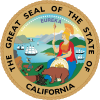 2003 gubernatorial portrait | |
| Governorship of Arnold Schwarzenegger November 17, 2003 – January 3, 2011 | |
| Party | Republican |
|---|---|
| Election | 2003, 2006 |
|
| |
| ||
|---|---|---|
|
Bodybuilding and business career
|
||
The governorship of Arnold Schwarzenegger began in 2003, when Arnold Schwarzenegger ran for Governor of California in a recall election. He was subsequently elected Governor when the previous governor Gray Davis was recalled and Schwarzenegger placed first among replacement candidates. Schwarzenegger served the remainder of Davis' incomplete term between 2003 and 2007. Schwarzenegger was then reelected to a second term in 2006, serving out this full term and leaving office in January 2011. Schwarzenegger was unable to run for a third term due to term limits imposed by the Constitution of California.
At the start of his first term as governor, Schwarzenegger proposed deep cuts in the state budget and was met with opposition in the California State Legislature. When San Francisco started granting same-sex marriage licenses at the behest of mayor Gavin Newsom, the governor ordered state attorney general Bill Lockyer to intervene in the matter and vetoed legislation that would have legalized same-sex marriage. Because of their opposition to his budget cuts, Schwarzenegger controversially called his opponents in the legislature girlie men. At the 2004 Republican National Convention, Schwarzenegger gave a speech endorsing the reelection of George W. Bush as President of the United States. In his State of the State address in 2005, Schwarzenegger proposed a redistricting reform that would have retired judges drawing new districts for the state. The first executions of Schwarzenegger's term occurred in 2005 with Donald Beardslee in January and Stanley Williams in December, which drew opposition from opponents of capital punishment and his native country of Austria. In June, the governor called for a special election in an effort to pass several of his proposed reforms. However, the voters ultimately rejected all of Schwarzenegger's propositions. Schwarzenegger started off 2006 by apologizing for holding the special election, which had cost the state money, and proposed a centrist agenda moving forward. The governor opposed the federal government's effort to build fencing on the Mexico–United States border and likened it to the Berlin Wall. In 2006, Schwarzenegger made several efforts to address global warming by signing the Global Warming Solutions Act of 2006 and negotiating the creation of a carbon emissions trading market with British Prime Minister Tony Blair. By year's end, the governor called on the federal government to give a deadline for the withdrawal of U.S. troops from Iraq.
On November 7, 2006, Schwarzenegger defeated Democratic state treasurer Phil Angelides in the 2006 California gubernatorial election, winning a second term as governor. In his second term, Schwarzenegger pledged to be a centrist politician and cooperate with the Democrats to resolve statewide political issues. Only days into the term, the governor proposed universal health insurance in the state and called for new bonds for schools, prisons, and other infrastructure. In May 2007, Schwarzenegger met with two of his counterparts in Canada, Dalton McGuinty and Gordon Campbell, in order to address climate change and advocate for stem cell research. An oil spill occurred in November when the Cosco Busan struck the San Francisco–Oakland Bay Bridge. In 2008, Schwarzenegger proposed a balanced budget amendment to the state constitution.
Also in his second term, Schwarzenegger proposed an austere fiscal policy in response to the Great Recession. Continuing his efforts to address environmental issues, the governor signed a memorandum of understanding with Mexican President Felipe Calderón and signed legislation pertaining to global warming. However, by October, Schwarzenegger vetoed 35 percent of the bills that the California State Legislature passed, which was the highest the rate had ever been since the statistic was first tracked when Ronald Reagan was governor of the state. In the election, voters approved Proposition 11, which shifted redistricting powers away from the legislature and created the California Citizens Redistricting Commission. In the midst of the Great Recession in 2009, Schwarzenegger called upon the legislature to pass deep budget cuts and warned that the state was facing insolvency. At the same time, the governor approved of President Barack Obama's federal stimulus bill. Schwarzenegger appointed Laura Chick as inspector general to oversee California's share of the stimulus bill. In May, the governor voiced his openness to marijuana legalization and a special election resulted in all but one of his state propositions being rejected.

